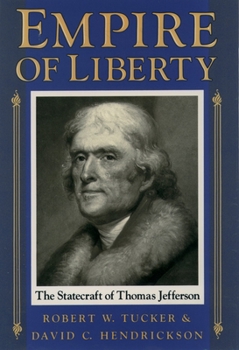Empire of Liberty: The Statecraft of Thomas Jefferson
Select Format
Select Condition 
Book Overview
Empire of Liberty takes a new look at the public life, thought, and ambiguous legacy of one of America's most revered statesmen, offering new insight into the meaning of Jefferson in the American experience. This work examines Jefferson's legacy for American foreign policy in the light of several critical themes which continue to be highly significant today: the struggle between isolationists and interventionists, the historic ambivalence over the nation's role as a crusader for liberty, and the relationship between democracy and peace. Written by two distinguished scholars, this book provides invaluable insight into the classic ideas of American diplomacy.
Format:Paperback
Language:English
ISBN:0195074831
ISBN13:9780195074833
Release Date:April 1992
Publisher:Oxford University Press
Length:384 Pages
Weight:0.35 lbs.
Dimensions:0.9" x 5.2" x 8.9"
Related Subjects
Americas Education & Reference English as a Second Language Foreign Languages History Humanities International Relations Leaders & Notable People Political History Political Science Politics & Government Politics & Social Sciences Presidents & Heads of State Revolution & Founding Social SciencesCustomer Reviews
1 rating
Empire of Liberty
Published by Thriftbooks.com User , 23 years ago
By examining United States foreign policy between 1783 and 1809 in their book "Empire of Liberty," Robert W. Tucker and David C. Hendrickson put the myth of Thomas Jefferson under fire. Tucker and Hendrickson's central thesis is that Jefferson's statecraft wavered between two contradictory principles of liberty and empire. While president, Jefferson often found himself torn between pursuing a foreign policy role that provided examples of liberty, and a role as an "active crusader in international affairs" (Chaudhuri, American Political Science Review, September 1991). Tucker and Hendrickson claim that Jefferson tried in vain to accomplish both of these conflicting goals. The aim of his "new diplomacy" was to pursue the traditional ends of security and prestige while renouncing the traditional means of entangling alliances and wars that had been constantly used by European powers in the past (Mayer, Washington Post, August 2, 1990). Instead, Jefferson would rely upon what he called "peaceable coercion"--a foreign policy establishing security by commercial arrangements, through the force of American ideals. Jefferson believed that liberty and empire could go hand in hand in the formation of United States foreign policy.Tucker and Hendrickson analyze several policies during the Jefferson administration to give historiographical context to their argument. The 1803 Louisiana Purchase is mentioned as a case in point. On the surface, the acquisition of almost half a continent at a negligible price was a great triumph of statecraft. Jefferson believed that this incredible land acquisition "preserved the republican character of the Union by removing the presence of dangerous neighbors and the prospect of wars that must result in the imposition of unbearable burdens on society" (Dallek, New York Times, July 1, 1990). It also insured that a predominantly agricultural political economy would be sustained while the United States experienced a steady increase in population. The Louisiana Purchase appeared to be clearly within the interests of the United States.However, Tucker and Hendrickson point out that in order to make this purchase, Jefferson abandoned several of his sacred principles of liberty. In acquiring Louisiana, Jefferson abandoned his deeply held commitment to strict construction of the Constitution, which did not specifically mention a power to acquire territory (Dallek 1990). Tucker and Hendrickson question this abandonment of principle in light of the circumstances revolving around the purchase. They point out that Napoleon would most likely have not repudiated the agreement if action had been delayed, and that the speedy ratification of the treaty that Jefferson advocated was not necessary (Cunningham, Journal of the Early Republic, September 1991). Like Henry Adams, whose history of Jefferson's administration the authors admire and frequently draw upon, Tucker and Hendrickson emphasize the president's abandonment of strict construction in re






